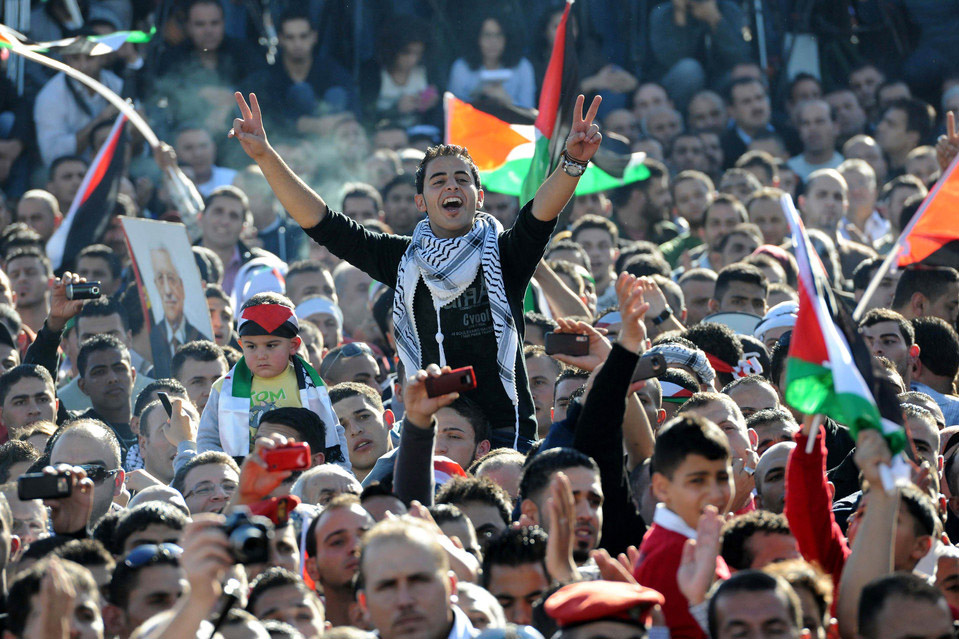Australia/Israel Review
Essay: What do Palestinians want?
Nov 27, 2015 | Daniel Polisar

The polls tell the story
Daniel Polisar
The most recent wave of Palestinian terror attacks, now entering its second month, has been mainly the work of “lone wolf” operators running over Israeli civilians, soldiers, and policemen with cars or stabbing them with knives. The perpetrators, many in or just beyond their teenage years, are not, for the most part, activists in the leading militant organisations. They have been setting forth to find targets with the expectation, generally fulfilled, that after scoring a casualty or two they will be killed or badly wounded. What drives these young Palestinians, experts say, is a viral social-media campaign centred on claims that the Jews are endangering the Al-Aqsa Mosque in Jerusalem and that Israel is executing Palestinian children.
Pundits and analysts in Israel and the West, struck by the elements that make this round of violence different from its predecessors over the past decade-and-a-half – which typically featured well-orchestrated shootings, suicide bombings or rocket fire – have focused on the motivations of individual attackers, on how and why the Palestinian political and religious leadership has been engaging in incitement, and on what Israeli officials or American mediators might do to quell the violence.
Absent almost entirely from this discussion has been any attempt to understand the perspective of everyday Palestinians. Yet it is precisely the climate of public opinion that shapes and in turn is shaped by the declarations of Palestinian leaders, and that creates the atmosphere in which young people choose when they wake up in the morning, whether to pull a knife from the family kitchen, and go out in search of martyrdom. In this essay I aim to fill the lacuna by addressing what Palestinians think both about violence against Israelis and about the core issues that supply its context and justification.
For this project, I examined over 330 surveys carried out by the four major Palestinian research institutes, each of which has been conducting regular polls for a decade or more: the Palestinian Centre for Policy and Survey Research (PSR) headed by Khalil Shikaki and its predecessor, CPRS; the Jerusalem Media and Communications Centre (JMCC); the Birzeit Centre for Development Studies (CDS), whose work was later continued under the same director by the Arab World for Research & Development (AWRAD); and the Opinion Polls and Survey Research Unit of An-Najah National University. Each of the four has conducted between 50 and 120 polls and has made the results available online in English (and generally in Arabic).
Although commentators typically describe the four as having differing perspectives, all are independent of any government, party, or other institutional framework that might introduce systematic bias into their work. All conduct face-to-face interviews; customarily include more than 1,000 people in each survey; use variants of “area-probability” sampling; and train fieldworkers extensively – which means that the margin of error for their polls is typically 3 to 5 %, with a confidence level of 95%. Moreover, many of their questions are asked repeatedly over time, making it possible to adjust for momentary swings of opinion. And since the questions asked by the four institutes are themselves often similar, it is possible to compare responses.
I also examined data from two international institutes that have conducted parallel surveys among residents in the West Bank/Gaza and in Arab and Muslim countries: the Pew Research Center, which since 2002 has included countries in the Middle East in its annual global surveys, and the Arab Barometer initiative, a consortium founded by Princeton University and the University of Michigan that since 2006 has overseen three waves of polling in the Middle East.
In what follows, I focus on three related questions: What do Palestinians think of Israel and of Jews? How do they view the Jewish claim to at least a part of the land of Israel, and especially Jerusalem? And what do they believe about the legitimacy, efficacy and desirability of carrying out terrorist attacks against Israelis?
* Under the terms of our copyright agreement with Mosaic magazine, the rest of this article can be read here: http://mosaicmagazine.com/essay/2015/11/what-do-palestinians-want/
This article is featured, in its entirety, in this month’s Australia/Israel Review, which can be downloaded as a free App: see here for more details.
Tags: Israel






